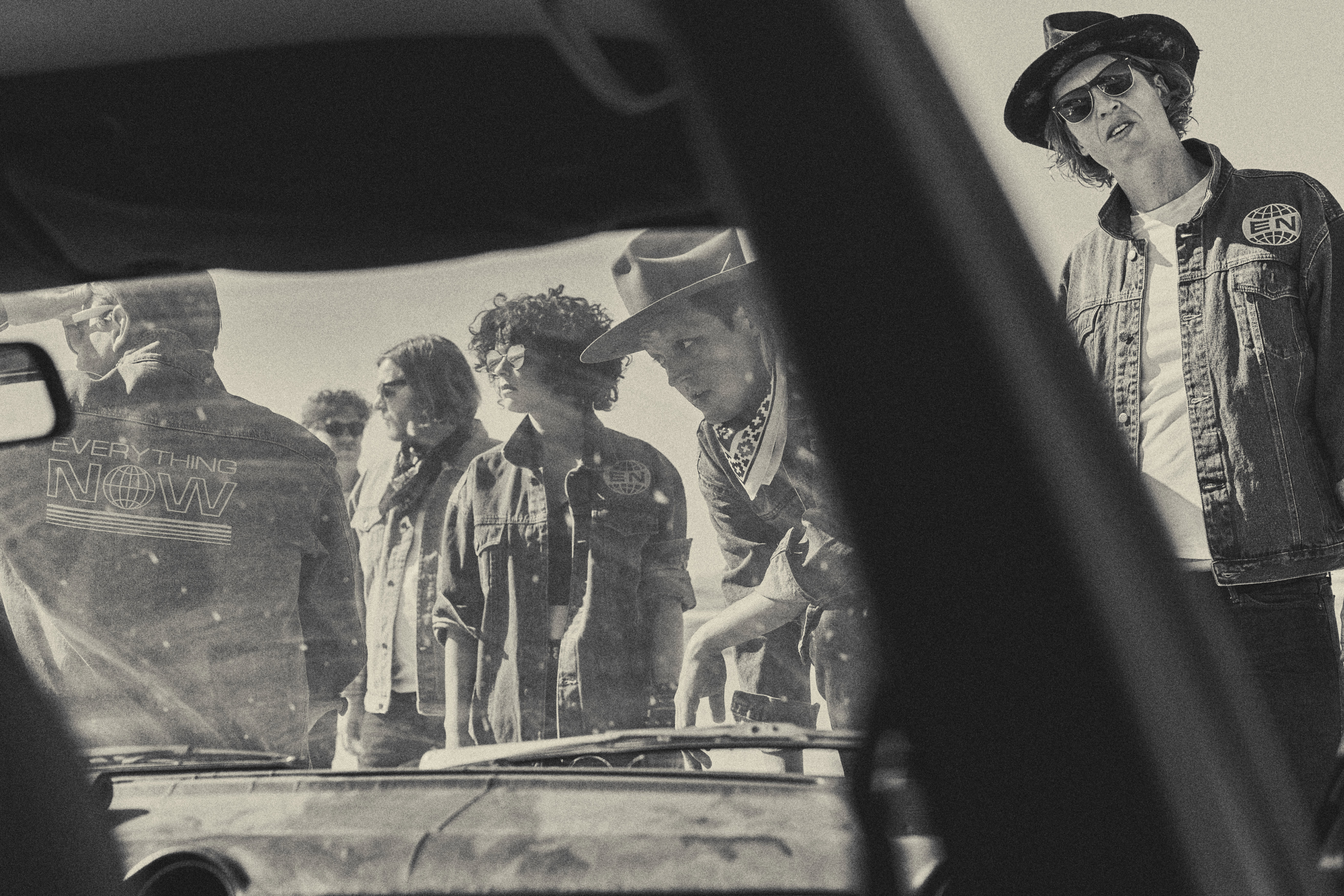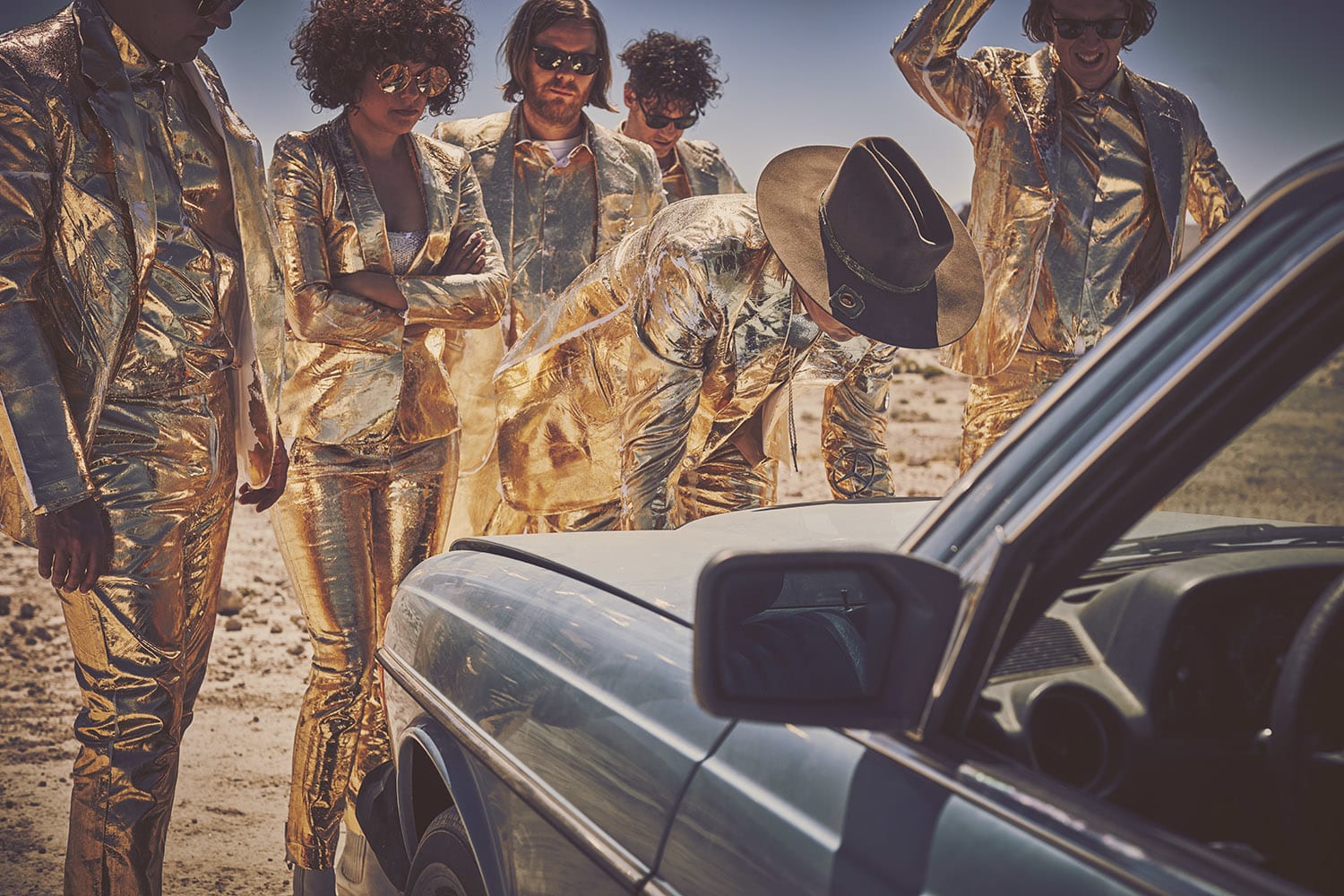
Are you wondering what the hell has been going on with Arcade Fire’s marketing campaign for their latest album? You’re not alone. Their social media presence has been, all in all, a bizarre and insufferable experience that's included everything from selling fidget spinners to sharing articles from fake websites like Entertainment Weakly that often link back to their own site.
The band had supposedly given up control of their marketing and social media accounts to Everything Now Content Division, a subsidiary of Everything Now Corp., a “finance company” that has been widelyreported as a fictitious entity. That is, until last week, when the band posted a fax that explained how and why their social channels devolved. Someone by the name of Tannis Wright had been fired.
For those who haven’t been following closely, here’s a brief timeline of what has gone on so far:
May 30: Russian-language Twitter account ArcadeFireTuba shared short clips featuring globe-shaped logos with the word “NOW” and the initials, “EN,” with the reputable Arcade Fire fan blog Arcade Fire Tube (the two have no affiliation). ArcadeFireTuba’s account was suspended almost immediately after sharing the videos.
June 13: Everything Now Corp. Facebook page is launched. Arcade Fire tags Everything Now Corp. in a post about Creature Comfort cereal.
June 23: Everything Now Corp. reveal they have written "Everything Now" as a jingle for the BBC without the band's consent.
July 17: Arcade Fire (through Everything Now Corp.) ask Facebook fans to "create Arcade Fire music" because they didn't have the perfect version of "Infinite Content" yet.
July 19: Everything Now Corp. announce exclusive focus groups to "help improve Arcade Fire."
July 24: Arcade Fire (through Everything Now Corp.) release statement addressing the strict dresscode for their Brooklyn, NY show on July 27.
July 28: Arcade Fire release Everything Now. Everything Now Corp. has not posted anything to Facebook since the album's release.
August 11: Arcade Fire release statement regarding Tannis Wright and Everything Now Corp.

Tannis Wright is a marketing intern who worked with Everything Now Corp., according to the Reddit AMA he held on July 21. He was the one who was at the helm of Arcade Fire’s frustrating and confusing marketing campaign. According to Arcade Fire’s statement, the band felt Tannis had “crossed the line from marketing into outright fiction.” And so, Arcade Fire would once again take care of their own social channels, marketing, and publicity. Here's an interview that Tannis did with The Shareables—another site that doesn't actually exist beyond this one page.
Arcade Fire fans are loyal. I know this firsthand. From Funeral to Reflektor, their fanbase has welcomed Arcade Fire’s often-experimental transitions from album to album with open arms—and for good reason. Their albums are great, and they're well received by both critics and fans alike. The band has also followed some fairly traditional album rollouts, with the exception of the guerilla-marketing campaign for Reflektor.
Since Arcade Fire has created such successful and effective formulas for introducing new albums, their bizarre marketing tactics for Everything Now raise the question, “If it ain’t broke, why fix it?”
In some ways, the band was completely transparent about their marketing plan—it’s all laid out on their song, “Infinite Content.”
“Infinite content / Infinite content / We’re all infinitely content,” Win sings over relentless percussion. It's a concisely packaged statement that the band drove home by sharing an infinite amount of content about things that show our complacency—or things we are “infinitely content” about.
As the mouthpiece for the band, Win insists that “it’s inherently pretentious to think that anyone else should hear what you have to say.” In his interview with The Globe and Mail, he likens this notion with social media and how our society feels that “what they’re having for breakfast is worth sharing.”
Win insists that “it’s inherently pretentious to think that anyone else should hear what you have to say.”
But how is this any different from the band doing the same thing through their art—especially when they still rely on corporate giants like Ticketmaster for ticket sales? Is this their way of poking fun at themselves in some self-reflective way?
I should emphasize now that I am a fan of Arcade Fire. Every album the band has released has had some profound effect on my growth; Funeral was a very personal source of healing for my 14-year-old self. When I finally got to see them at Coachella in 2014, I cried. I'm seeing them on their Infinite Content tour in October.

Am I disappointed with Everything Now? Yes, but this article isn’t about the music. Did the invasive album rollout color my judgment of the album? It’s hard to say, as it was frustratingly hard to ignore. Win says that was the point.
“It’s really kind of an experiment, kind of an art experiment.” Win told Zane Lowe during his Beats 1 interview. “We did it kind of full well knowing that people would be talking about the promotional campaign instead of the music, which is kind of exactly the point.” Win insists that it isn’t a sacrifice of the album itself, because even though “people are sheep to a certain extent,” they nonetheless “have ears.”
It’s really kind of an experiment, kind of an art experiment. We did it kind of full well knowing that people would be talking about the promotional campaign instead of the music.
“So you can read something-means-something all you want and then you hear it for yourself,” he continues. “Part of what we’re after is exactly that: to have people question what they read a little bit, just question it.”
Even after digging up as much as humanly possible about Everything Now Corp. and Tannis Wright, much of it still doesn’t add up. So, we went to the source. We reached out to Everything Now Corp. through Twitter and, surprisingly, Tannis responded.
Keep in mind that the resignation fax stated that Tannis would no longer have access to Arcade Fire’s social accounts. Win had also mentioned twice, onrecord, that the band had been working with writers on their marketing campaign. That being said, our interview with Tannis Wright is in full below. Decide for yourself.
How did you get involved with Everything Now Corp.? Why did the corporation think you were a good fit for Arcade Fire?
I’m a social-media intern at the Everything Now Corp., and my bosses thought that I would be a good fit for the account because I knew a little bit about music. I have a Foghat patch on my duffel. I also pushed for it a little bit, because even though I didn’t really know much about Arcade Fire at the time, I was getting a little burned out on working other types of accounts. It seemed a little more glamorous than working on, for example, an acid-reflux campaign. And parts of it were!
We were the noisiest and boldest, which is what it takes to break through the constant advertising barrage that exists today. Even if you have a product that you totally believe in, sometimes you still have to play the game.
What was the overall goal (or goals) of your marketing plan for the album rollout?
The goal of marketing anything is to make people aware of it! If any marketing person tells you different, they’re lying. There are other aspects, of course, beyond awareness, like brand loyalty and product affinity. But I wanted to make everybody—fans and non-fans alike—aware of Everything Now. Once they knew it existed, my secondary goal was to get them excited, so that they would in turn become unpaid marketers for the band. As I think you’ll acknowledge, I was pretty wildly successful. People were talking, and publications that had never acknowledged the band before were covering every little thing.
I’ll also say this: This campaign really engaged people’s emotions in a way that I didn’t expect, and in a way that wouldn’t have happened if we were marketing a different kind of product. People don’t get as passionate on Twitter about Pepcid AC. Some people were clearly confused or annoyed, even as they were engaged. Some people embraced it. I didn’t see a lot of the marketer’s worst enemy: “Meh.” And we clearly hurdled the marketer’s greatest challenge, which is getting lost in the pervasive “ocean of noise.” (See, I did my Arcade Fire homework once I signed on!) We were the noisiest and boldest, which is what it takes to break through the constant advertising barrage that exists today. Even if you have a product that you totally believe in, sometimes you still have to play the game.
Was the band initially supportive of the direction? Did the band express any concerns?
I don’t think the band really noticed any of the marketing for a while, which is kind of nice for somebody in my position! It offers a lot of freedom to stretch your marketing muscles. I think they saw the Twitter followers shoot up into the stratosphere, and they saw a lot of the press pickup. But eventually, as I’m sure you saw, they did express concern about some of the methods I used to try and help them advance their careers. We had some Twitter and e-mail exchanges that I thought were playful, but in hindsight maybe they didn’t think so. You can’t be all that concerned, you know?
Think about it this way: Say you want to sell people a really nice chair. That’s your job, to make them aware of and excited about this chair. At some point, if the person who designed that beautiful chair has a problem with your methods of selling it, you have to kind of tune them out. You’re making them rich, and you’re getting their beautiful chairs underneath the butts of people who love them. If the artist feels a little bit of unease about your thoughts on the chair, that’s natural. A good marketer knows how much to push back against that.
At what point did Everything Now Corp. realize the band should regain control over their own social media platforms?
The contract between ENCO and the band is very complicated, and honestly a little bit above my pay grade, though I have studied it closely. First of all, they didn’t really want to have a say, exactly. Second, that contract explicitly took away their say in some of these things, which is why I was tasked with actually taking over the band’s own Twitter account when the company realized they weren’t really holding up their end of the marketing bargain. And without getting into too much detail, certain things were done on that Twitter account and elsewhere that led to me be taking off the account. But believe me, my bosses were happy with the work that I was doing. They can’t really say it publicly, I guess, but the band sold a ton of records, a ton of merchandise, and got the kind of press that usually costs millions of dollars. For a fraction of the usual cost.
Most people believe and many publications have reported that Everything Now Corp. is a fictitious corporate entity, so what was the intention of bringing you into the mix?
The internet is a weird place, full of conspiracy theories. Pretty much any crazy thing you believe, you can have your thoughts validated with a quick Google search. I was a flat-earther for a few months last year because of something I read. But you know what they say: Absence of evidence is not evidence of absence. I’m sitting here typing words to you from my small office in Saipan, which is paid for by the Everything Now Corporation. You’ve seen our logo everywhere. You might not know what a company like Cargill does, but that doesn’t mean it doesn’t exist!
I personally find it mystifying that people hear something in 'Everything Now' that says that corporations are evil. Why would the band say that when they just got into bed with one of the biggest corporations in the world?
Are you real? Would you be able to confirm or deny that "Tannis" is a product of another lesson that the band is trying to teach us about the evils of "The Corporation"?
Another weird question I’ve gotten a lot. Here’s how I answered it on the Reddit AMA I did a few weeks back: If you worked at a department store and somebody came up and said, “Are you real or are you one of these shirts on the rack?” what would you say? It's not a question a sane person can answer.
I personally find it mystifying that people hear something in Everything Now that says that corporations are evil. Why would the band say that when they just got into bed with one of the biggest corporations in the world? If you can point me to a lyric on the record, or to an interview in which anybody in the band says that, I’d love to hear it. People have pointed out to me that “Every room is my house is filled with [expletive] I couldn’t live without” is supposed to express frustration with overconsumption, but honestly I found that line touching—it made me think of all the mementos that I have that I couldn’t live without. Who’s to say I’m wrong? But where has the band said that “The Corporation” is bad? I think that’s just a product of lazy journalism, to be honest. Which is actually fine, because as long as they’re writing about the band, I don’t really care what they’re saying!
But I have to say that, having listened to the album a minimum of four times per day since it was finished, I think that maybe some writers missed some cool stuff that I caught, or at least that made me think. I’m not sure what it means, exactly, but “born in a diamond mine, it’s all around you but you can’t touch it” gave me a little bit of pause as I tried to wrap my head around it. It made me think about America, and it made me feel a little bit bad, but I can’t really articulate why. Also, and I haven’t admitted this to anyone before, but “We Don’t Deserve Love” made me cry a little bit, and it made me think. I might take a year off to just travel soon. The days-of-the-week rap is still my favorite, though I realized after a few weeks of listening that maybe it’s not about partying every day, which can get exhausting when you get a little older.
Does it matter whether or not "Tannis" is real?
It matters to my cats! And my mom! And my roommate, Bucky! And presumably all the people that I’ve touched with my marketing! No quotation marks necessary!
Win has emphasized how important it is to handle things with humor. Why satirize corporations when Arcade Fire had recently signed on with Sony/Columbia?
Again, I don’t see any satire of corporations, and believe me, I would have fought against if I had seen it. It’s not like Win is singing, “Don’t shop at Wal-Mart, they stink,” which never would have flown with ENCO legal anyway. And I know for a fact that Win buys toilet paper at CostCo, not at the artisanal toilet paper shop or whatever.
Also, the band itself is a corporation! Your family is a kind of corporation! You could just as easily say that Sony/Columbia is not just a corporation, but a big building full of nice, hard-working people. That said, we certainly helped the band a little bit with their branding, which has always been a little lacking, so maybe that contributed to the confusion. Logos are great, as I’m sure you know. We made them seem a little bit less pessimistic, I think, and a little less grouchy. I don’t know how funny it all is, necessarily. I’ve heard Win is a funny guy, but I didn’t really see that side of him. But I honestly think the “satirizing corporations” thing is fake news, if I can throw that term back.
U2 sells “The Fly” sunglasses. Springsteen sells those little distressed American flags. Why is a fidget spinner such a crazy idea? The idea actually came about because John Cougar (pre-Mellencamp) did a branded Rubik’s Cube in ’82.
Ticket sales for Arcade Fire's upcoming tour still rely on corporate giants like Ticketmaster. How is this different from the band selling, for example, fidget spinners or cereal?
Well, one of them is a complicated service provided by a very successful company, Ticketmaster, which deserves to be paid for that service. That’s my personal opinion. And the other is a band selling merchandise, which every successful band in the history of the world has done. The cereal, it should be noted, was never made available for sale, because we had a run-in with the FDA. That’s why it was given away in special scavenger hunts. Merchandising and a little bit of showbiz is nothing new in music. The Rolling Stones announced their 1975 tour from a truck in New York City, and their biggest piece of merch on that tour was a branded Pet Rock, which was the biggest toy in the world at the time. They did hula-hoops, they did Legos, everything with the tongue logo. And now they’ve got a museum exhibit, they’re not looked down on. U2 sells “The Fly” sunglasses. Springsteen sells those little distressed American flags. Why is a fidget spinner such a crazy idea? The idea actually came about because John Cougar (pre-Mellencamp) did a branded Rubik’s Cube in ’82 that, when you solved it, a microcassette of his album popped out. He sold those for $40, which if you factor in inflation, is about how much we sold the USB spinners for. And he made more money selling those than he did selling records.
A lot of the marketing also revolves around sharing "fake news," which can easily be interpreted as a political statement of sorts. What effect does "fake news" have on the music industry? What is the band trying to say with this?
I can’t speak for the band, as I am no longer authorized to do so. The Everything Now Corporation is careful not to make any political statements, as a matter of good business sense. Personally, I would argue that there’s no such thing as “fake news,” and I would defy you as a journalist to find anything published about Arcade Fire during my tenure that is demonstrably false. That said, I blame Twitter itself for some of the confusion. Sometimes there just aren’t enough characters to add nuance like “Hopefully this is happening” or “We’re in the early stages of working on this thing.” That’s one of the reasons I like to fax sometimes, because there’s no limit to what you can say.
Is there anything else you'd like to add?
Thanks for your interest. I regret that the band, whose music I eventually came to enjoy quite a bit, was upset by some of the marketing tactics that I employed. I think the results speak for themselves, though. I got them some terrific opportunities, opened a lot of doors, and really got people talking about them at a crucial time. I think time and continued success will heal those wounds, and I hope to work with them again at some point. And I hope that they’ll think of me fondly when Everything Now reaches gold and then platinum status. They can send my plaque to HQ.
I would love to market another band in the future, because it’s really freeing. There are so many regulations when you’re trying to sell, for instance, a prescription ointment or an alcoholic beverage. There are so many things you can and can’t say. With a band, there’s none of that—you can say pretty much anything you want! It’s kind of like a political campaign in that way, which is another area of interest for me.





